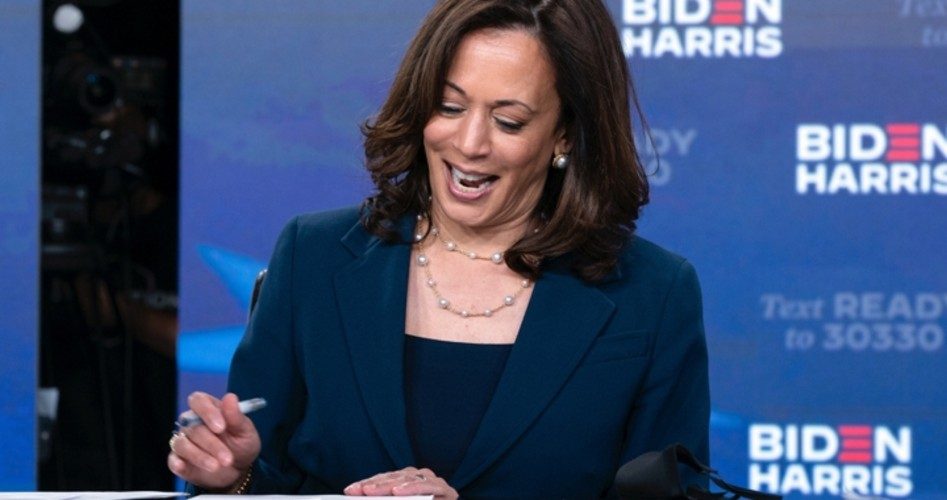
Democrat vice-presidential candidate Kamala Harris didn’t really mean it when she all but called Joe Biden a racist during the second Democrat presidential debate last year.
Nor, apparently, did she mean it when she said she believed the many women who have accused Biden of unwanted and inappropriate touching and fetishistic hair sniffing.
Harris inadvertently blurted out the truth during an interview with leftist TV host Stephen Colbert.
“It Was a Debate”
Raheem Kassam of the National Pulse helpfully reminded his readers yesterday about Harris’ laughable interview with Colbert in June, during which he asked her about the sudden reversal of her opinion about Biden.
Colbert called it a “trashing,” but Harris did more than trash his record, of course. She strongly implied that Biden was unfit for the White House because he was bosom pals with Southern “segregationists.”
Said Harris during Democrat debate No. 2:
It was hurtful to hear you talk about the reputations of two United States senators who built their reputations and career on the segregation of race in this country. And it was not only that, but you also worked with them to oppose busing.
And, you know, there was a little girl in California who was part of the second class to integrate her public schools, and she was bused to school every day. And that little girl was me.
“It was a debate,” Harris told Colbert when he asked about it:
Colbert: Not everyone landed punches like you did, though.
Harris: It was a debate.
Colbert: So you don’t mean it?
Harris: It was a debate.
So no, she didn’t mean it.
Biden’s wife Jill thought she did: “It was like a punch in the gut.”
The Women
So, too, must have been Harris’ remark two months earlier when she said she believed the women who stepped forward to say Biden is a creep who can’t keep his hands — or nose — to himself.
“I believe them, and I respect them being able to tell their story and having the courage to do it,” she said.
Oddly, after Harris dropped her campaign and became the obvious choice for veep, particularly when Biden promised to pick a woman, she lost faith in the sisterhood #Me Too complaints.
When Tara Reade surfaced in March to say Biden sexually assaulted her when she worked for him in 1993, a charge corroborated by multiple women and witnesses whom Reade told about the assault, she lost the prosecutorial zeal with which she pursued the obviously false charge against U.S. Supreme Court Justice Brett Kavanaugh during his confirmation hearings.
Reade “has a right to tell her story,” Harris said. But Harris clearly didn’t believe it because Biden has “been a lifelong fighter, in terms of stopping violence against women.”
“Over the coming months the media will bend over backwards to accommodate Harris’s phoniness, and it’ll become increasingly apparent between now and November,” Kassam wrote:
But the Harris pick is already biting Biden in the butt.
This week Rasmussen reported that a third of black voters in the United States said Harris on the ticket makes them less likely to vote for the Democrats.
And while most polling companies will continue to tell the Biden campaign that they are ahead — in some cases by double digits — it is becoming abundantly clear to the psephology-minded that Biden’s “lead” is much like Hillary Clinton’s: reliant on an enthusiasm that simply isn’t there.
Slave-owning Ancestors
Harris might have other trouble, though, explaining her ancestors to the Black Lives Matters Marxists who certainly hoped for a more radical choice for vice president such as Karen Bass, the Fidel Castro supporter who toiled in his worker’s paradise for the Venceremos Brigade, a Cuban intelligence front.
Harris descended directly from slave-owning Jamaicans, her father says.
That means she’s quite the opposite of what she has implied she is, meaning an “African-American” descended from slaves.
The question is what Harris believes about herself, and whether she even consider herself an American. Two days ago, she congratulated India on its independence from Great Britain:
“Happy Indian Independence Day!” she tweeted. “Reflecting on the past 74 years, it’s remarkable how much progress our people have made in the fight for justice. I hope you’ll join me today in celebrating and then commit to building an even better future.”
Photo: AP Images
R. Cort Kirkwood is a long-time contributor to The New American and a former newspaper editor.

